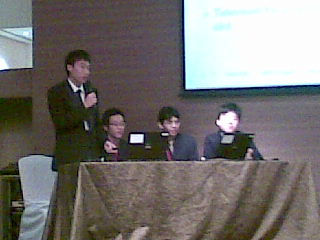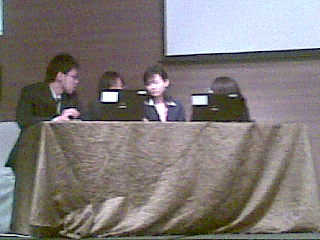 I’m liveblogging from the finals of the inaugural Public Policy Challenge in Singapore. It’s like a business case competition but for government policy instead. This might be useful for people who want to “revise” for future Public Policy Challenges.
I’m liveblogging from the finals of the inaugural Public Policy Challenge in Singapore. It’s like a business case competition but for government policy instead. This might be useful for people who want to “revise” for future Public Policy Challenges.
Team One-Sixy-Five from NUS.
Pros: They focused a lot on POLICY DIRECTION, in the sense of “here are the problems, and this is what needs to be done” without the baggage of actual programmes. I found that their suggestions and our suggestions have many similarities, but their approach is more broad and shows their rationalization process rather than ours in “here’s the solution programme , this is why we chose it”.
Cons: They didn’t seem to have completely consistent or well-thought out policy direction and seem to flounder in Q&A.
Things you must do: Still look at policy.
Crisis situation: good stuff doing consideration of a quite comprehensive consideration of many different ministries resources and interests. They also gave foreign policy, which I kinda neglect is also policy.
———————————
Team PVP
Crisis situation: has a more hands-on approach than 165. Also spills over to economy and proposes a program but doesn’t not elaborate much. I feel that their crisis situation wasn’t as broad as 165, and they don’t have a wholesome foreign policy.
Pros: Shows graphs. SHEEET. and more graphs (although only to illustrate general cost-push inflation). Follows the questions to the T (1. What are the key trends? 2. What must we pay attention to? 3 … ). Clear identification of variables and show cost-benefit analysis, which must appeal to some PS21/NPM junkies. Best is that they’re highly aware of current scheme and propose modifications, and I think that’s why they got into the finals.
Cons: Feels very messy compared to the previous, probably because of a greater focus on programmes. At times, their presentation feels tedious. Judge points out that they left out higher income group.
Small conclusion: don’t ask questions back to the judges.
Intermediate conclusion: Doesn’t matter what policy you suggest — they suggested quota on foreign workers, sooo not liberal — but as long as you show that all policies gel and the rationale is sufficient. At this iteration, it’s about how much policy you put in at the semis (as opposed to programme), and how well your argument at finals.
Interesting Note: There’s a flaming liberal as the last speaker. Cites Benedict Anderson’s “Imagined Communities” and recommends online presence of Speakers Corner. Stuff on Television. “We must seek opportunity in strife”.
Interesting Note 2: Nice to grandstand a bit.
Interesting Note 3: Judge is pissed. He’s nitpicking on their policy-programmes. Don’t ever get into this situation. He tries to drag them to the slaughterhouse. They’re apologists for their decisions now.
Commentary: The structuralist in me sees the pro-democrat tendencies of educated university students.
Overheard: They’re in the finals because they wore blazers.
———————————
Team Quintessential
Pro: They framework specifies between issues in a big hierarchical diagram and have lots of tables.
Con: Complex diagrams get confusing.
Pro: Their framework gives their analsyis methods, using a SFA test (Suitability, Feasibility and Acceptability).
Average: They also do about the same thing as the last team for ministries response to the crisis situation. They draw out tables. Useful, but presents too much information. Might as well close my eyes.
Pro: Take into consideration communication strategies. The previous judges talked about that.
Con: More information overload in a hierarchical diagram! Don’t do it in powerpoint slides. Worse, hierarchical diagrams in a table. Not sure if the reasoning and demonstration of it is sound.
Point of departure: They actually propose a radical policy direction to push alternative fuels as a solution to inflation since we import it as we buy fuel like it’s the end of the world.
Con: Focuses too much on the constraints and context. When are you going to get to the policy? When they do get to the policy, SFA analysis in a table looks daunting. Maybe should split to a written policy and actual slimmer policy presentation? Actually, the tables look really good if it were in a report, but not in a powerpoint presentation.
Minor Reedeeming Pro: They’ve got time to actually do the work. Sorry our group is lazy because two people are friggin down with the flu.
Most awesome quote: “Let me examine to you the issue.” [sic] (I’m sorry, I’m horrible.)
Con: It’s only Second Recommendation now, *sigh*
Pros: Well, you can’t deny that they’re comprehensive… but like all substantiated things, it’s boring. I wish best luck to the Judges.
Thought: I think that they willl win since it’s 75% content and 25% presentation. I give them 0 for presentation and 75 for content if I could be bothered to pay more attention to their argument. Model civil servants.
Notes: Remember to consider budgeting and where-is-the-government-going-to-find-the-money-to-do-it. and short-term and long-term solutions.
Interesting note: They quote Mencius: “Everyone has a heart for others.” UH OKAY awesome logic
Interesting note 2: I perk up at summary. Not good.
EDIT: Winner is team PVP. Meh.




 Updated a few times monthly
Updated a few times monthly